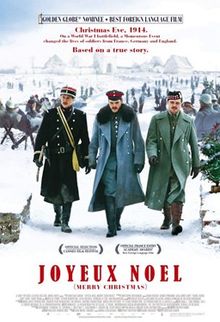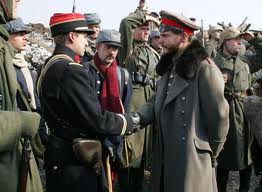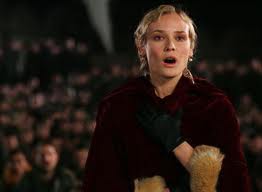 On the night before Christmas in 1914, the France-Scotland allied forces face a narrow no man’s land from a trench in northern France as the occupying German army advances further onto French territory. International opera singer Nikolaus Sprink, who was enlisted by the German army, is visited by his lover, soprano Anna (Diane Kruger). The night before Christmas, Father Palmer, who is serving Scotland as a combat medic, plays a Christmas song with a bagpipe in the Scotland camp, and Nikolaus of the German camp starts to sing along to the Christmas hymn. The France-Scotland army find themselves applauding, and Nikolaus stands in the neutral no man’s land and continues to sing. Prompted by this, the commanding officers of the three countries meet in the neutral zone, and decide to suspend the combat for Christmas Eve. Father Palmer gives Christmas mass, and Anna sings a hymn. They suspend combat the next day, too, burying their dead comrades abandoned in the neutral zone, enjoying soccer, sharing chocolate and champagne, and showing each other photographs of their families. However, the time comes that these soldiers who shared a brief moment of camaraderie must resume fighting. The military authorities of each army and the upper echelon of the church are angry when they learn about this exchange of friendship, and the soldiers who exchanged friendship face severe consequences for their conduct.
On the night before Christmas in 1914, the France-Scotland allied forces face a narrow no man’s land from a trench in northern France as the occupying German army advances further onto French territory. International opera singer Nikolaus Sprink, who was enlisted by the German army, is visited by his lover, soprano Anna (Diane Kruger). The night before Christmas, Father Palmer, who is serving Scotland as a combat medic, plays a Christmas song with a bagpipe in the Scotland camp, and Nikolaus of the German camp starts to sing along to the Christmas hymn. The France-Scotland army find themselves applauding, and Nikolaus stands in the neutral no man’s land and continues to sing. Prompted by this, the commanding officers of the three countries meet in the neutral zone, and decide to suspend the combat for Christmas Eve. Father Palmer gives Christmas mass, and Anna sings a hymn. They suspend combat the next day, too, burying their dead comrades abandoned in the neutral zone, enjoying soccer, sharing chocolate and champagne, and showing each other photographs of their families. However, the time comes that these soldiers who shared a brief moment of camaraderie must resume fighting. The military authorities of each army and the upper echelon of the church are angry when they learn about this exchange of friendship, and the soldiers who exchanged friendship face severe consequences for their conduct.
It may be unbelievable that soldiers of enemy nations really shared friendship during the war, but this movie was made by connecting various real facts. The Christmas truce and the exchange of friendship between enemy nations during World War I did not make it into official records. However, the soldiers who survived the Western Front told the truth to family and friends by word of mouth and with photographs after they returned.
In 1914, it actually happened that a German tenor singer, Walter Kirchhoff, visited the German army to offer moral support and sang in the trench; on the other side of no man’s land, a French officer, recognizing Walter’s voice from a performance of his in the Paris Opera house, applauded. Walter then crossed the neutral no man’s land to greet the officer who had applauded. It also happened that a cat loved by both the German and French armies was arrested by the French army. It is said that this cat was later executed as a spy. In addition, it seems to be true that soccer and games were enjoyed between enemy armies.
This Christmas truce happened on the first Christmas after World War I started. World War I was the first ever all-out, world war, and nobody knew what direction the war would develop; at the beginning, there was an optimistic feeling that the war would be over quickly. However, as the war continued, dangerous weapons and poisonous gas were used. Also, the airplanes that were initially used for reconnaissance were transformed into terrible fighters. As the war became violent and cruel, events like the Christmas truce depicted in the movie became rare.
 What brought these enemies together momentarily were the forces of music, sports, and religion. All the battling nations—Germany, France, and England—were Christian, and people’s faith was strong in those days; Christmas was really important, and it was the motivation behind the Christmas truce. It was easy to understand enemy nations that were similarly Christian. Something like the Christmas truce wouldn’t have happened if it had been a battle between Muslims and Christians, or Muslims and Jews.
What brought these enemies together momentarily were the forces of music, sports, and religion. All the battling nations—Germany, France, and England—were Christian, and people’s faith was strong in those days; Christmas was really important, and it was the motivation behind the Christmas truce. It was easy to understand enemy nations that were similarly Christian. Something like the Christmas truce wouldn’t have happened if it had been a battle between Muslims and Christians, or Muslims and Jews.
It was Germany that underwent the greatest political change during World War I. Germany was still an empire in those days, and the people fought in the name of Wilhelm II, the German emperor and Prussian King. However, as the Great War continued, the war-weariness of the nation increased. On November 3, 1918, the sailors of the Kiel naval port mutinied, and, with the resulting populist uprising, the German Revolution ensued. Wilhelm II fled to the Netherlands, thus ending World War I. The Weimar Republic with the principle of parliamentary was established in Germany.
After that, the German government was unstable. After their defeat, they received economic retribution from the victorious nations, and the German people lived miserable lives. Within this dissatisfaction, the Nazis were formed in 1920, and this led to World War II. In this movie, the First Lieutenant Horstmayer, who led the German faction and agreed to the Christmas truce, was Jewish. Crown Prince Wilhelm, who was the highest commanding officer on the Western Front, was enraged when he found out about the Christmas truce, and sends First Lieutenant Horstmayer’s unit to the dangerous Eastern Front; at this time, the Crown Prince Wilhelm points with his sword at the iron cross of the German army at the chest of the First Lieutenant, and shouts, “You don’t deserve the iron cross.” This scene suggests the fates Jews met 20 years later—having their German citizenship revoked, not being able to apply for the German army, and being sent to concentration camps.
If I were to say the message of this movie in a few words, I might say, “The willingness for citizens to fight is created by the leader of the nation.” The movie starts with a scene with elementary school students in Britain, Germany, and France having patriotism hammered into their heads and being taught hostility towards their neighbors. Because citizens are made to think that soldiers of enemy nations are faceless beasts, they can fight in a war. However, through the exchange on the night of Christmas Eve, the soldiers recognized each other as human for the first time, and it became difficult to kill each other. When the First Lieutenant Audebert leading the French army received criticism for the Christmas truce, he responded, “The German soldiers are more human compared to these people shouting to kill Germans!” Also, the audience will forever remember the sentiment of the soldiers who had to return to war: “We (today only) can forget war. But the war won’t forget us.”
 This movie is an impressive work that depicts beautiful details, but if I were to illuminate a fault, it is that Diane Kruger who performed as an opera singer was too obviously lip-syncing. The hymn which she sings in front of the soldiers should be a huge turning point, but her body doesn’t quiver as she sings, and her mouth was just monotonously opening and closing; there are too many moments when the lyrics and her mouth movement are out of synch. Since she looks like a beautiful picture with only her mouth opening and closing, quite a few viewers may lose empathy at this point of the movie. Diane Kruger is certainly beautiful, but for this scene, I would have preferred watching a real opera singer, such as Natalie Dessay who supplied the real singing voice in this movie. The audience may be deeply moved by the musical performance of Father Palmer of the Scottish army on the bagpipes, rather than Diane Kruger’s lip-syncing. Tea with Mussolini also features a bagpipe when the movie ends with the Scottish army entering an Italian town occupied by the Nazis. The sound of the bagpipe is joyful, optimistic, sorrowful, and poignant.
This movie is an impressive work that depicts beautiful details, but if I were to illuminate a fault, it is that Diane Kruger who performed as an opera singer was too obviously lip-syncing. The hymn which she sings in front of the soldiers should be a huge turning point, but her body doesn’t quiver as she sings, and her mouth was just monotonously opening and closing; there are too many moments when the lyrics and her mouth movement are out of synch. Since she looks like a beautiful picture with only her mouth opening and closing, quite a few viewers may lose empathy at this point of the movie. Diane Kruger is certainly beautiful, but for this scene, I would have preferred watching a real opera singer, such as Natalie Dessay who supplied the real singing voice in this movie. The audience may be deeply moved by the musical performance of Father Palmer of the Scottish army on the bagpipes, rather than Diane Kruger’s lip-syncing. Tea with Mussolini also features a bagpipe when the movie ends with the Scottish army entering an Italian town occupied by the Nazis. The sound of the bagpipe is joyful, optimistic, sorrowful, and poignant.
